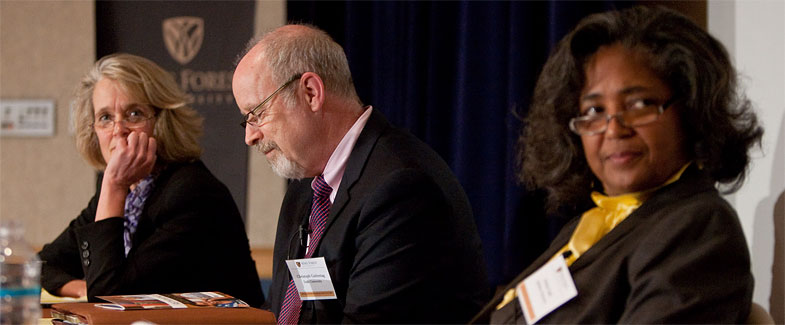Rethinking admissions

Wake Forest is the catalyst for a national discussion
Admissions directors and social scientists from leading colleges and universities, as well as top researchers throughout the country, gathered at Wake Forest April 15-17 for a national conference on the future of the college admissions process.
For video, podcasts, and blog entries of the conference, visit Rethinking Admissions »
Provost Jill Tiefenthaler, who organized the conference, “Rethinking Admissions,” with Associate Professor of Sociology Joseph Soares, sees growing interest in reducing the emphasis on standardized tests, a move Wake Forest made last year by making the SAT optional for applicants.
“This represents the first step on a higher road in higher education, beginning with more equitable admissions processes,” Tiefenthaler said. “In his address to Congress, President Obama cited an urgent need to expand the promise of education by making higher education more affordable, and he set a goal for America to again have the highest portion of college graduates in the world by 2020. To reach that goal, colleges must re-examine their selection methods to ensure they are providing opportunities to deserving students from all socioeconomic backgrounds.”
Conference panelists represented universities including Berkeley, Duke, Harvard, Ohio State, Princeton, Texas, Virginia, and Yale and spoke on topics such as how to predict engaged and successful students, the academic and social goals of admissions, and evaluating standardized testing. Robert Morse, director of data research for U.S. News & World Report, spoke on “College Rankings: The Good, the Bad, and the Ugly.”
Pulitzer Prize-winning author and journalist Daniel Golden skewered the nation’s elite universities in his keynote address, “Slumdog Ivy Leaguer,” by suggesting that there are numerous ways those institutions use special preferences and backdoor methods to admit the children of alumni, corporate tycoons, Hollywood celebrities, influential politicians, and athletes — all in the pursuit of philanthropic dollars needed to support the enterprise of higher education. Golden believes that elite colleges should find other ways to maintain the loyalty of their alumni, beyond rewarding their commitment with preferential treatment in admissions.

“College admissions practices need to reflect the values of the institution. At Wake Forest, our process reflects the value of educating the whole person.”
Jill Tiefenthaler, Provost
Admissions officers and others at the conference expressed varying opinions on the value of the SAT, but most agreed that standardized test scores should not overshadow other vital information needed to provide equitable access to all qualified applicants.
Addressing these challenges requires different approaches at different institutions, as the wide range of conference presentations illustrated. Some with large endowments, such as Harvard, are focusing on increasing financial aid to low-income students.
Public universities, facing political considerations, are taking a variety of steps. The University of Virginia has eliminated its early decision option. The University of Texas reports ten years of success with its “top 10 percent solution,” which guarantees admission to every in-state student in the top 10 percent of their high school class to any school in the University of Texas system. The University of California system has been wrangling over the use of standardized tests for forty years and will implement a new policy in the fall of 2011, which drops the SAT II subject tests but retains the SAT I.
Wake Forest has begun emphasizing interviews to get a better sense of personal qualities that numerical assessments cannot quantify. “College admissions practices need to reflect the values of the institution,” Tiefenthaler said. “At Wake Forest, our process reflects the value of educating the whole person.”
Wake Forest received 10,535 applications for the incoming freshman class, a 16 percent increase over last year. About 8,000 of those applicants were interviewed by admissions counselors in-person, via webcam, or through a written, online interview.
“We anticipated growth in the applicant pool, but remained committed to using personal interviews to ensure that we retained our high standards,” said Martha Allman (’82, MBA ’92), director of undergraduate admissions. “We found that the interviews truly helped us differentiate among applicants. We began to wonder how we chose a class without interviews.”
Said Tiefenthaler, “We wanted to be a catalyst for this national discussion. When you make a bold decision, such as Wake Forest has done in its admissions process, you must be ready to defend your position. You must also be open to criticism and flexible enough to adapt and learn throughout the process. I applaud the open discussion we have shared at this conference, and we look forward to sharing the results of our first class crafted on an SAT-optional model.”
